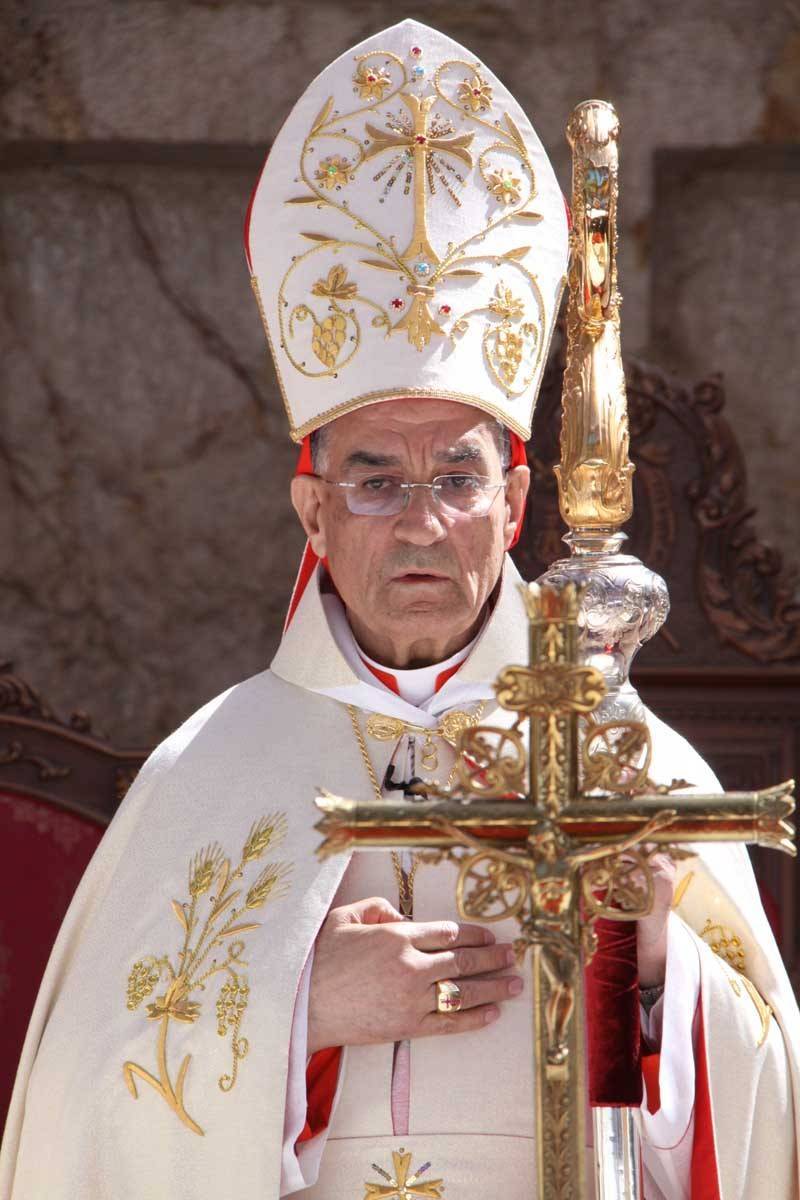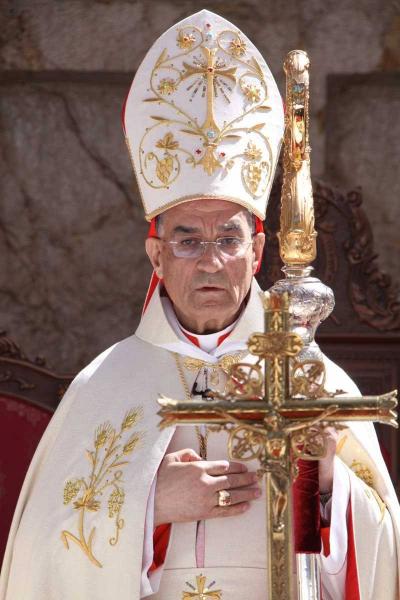Maronite Patriarch Mar Bechara Boutros Al-Rai said in an interview with the newspaper "An-Nahar": "We launched a call for an international conference under the auspices of the United Nations for Lebanon because the country has reached an unbearable state, and it has become sick with everything on hold. This does not require proof: to elect a president, we wasted two and a half years. To name a prime minister and form a government, we waited about a year, and parliamentary elections are repeatedly postponed."
The Maronite Patriarch continued: "The banks have regressed, people's money has vanished, half of our population has become poor, the country is sick, and we are a founding, active member committed to the charters of the United Nations and the League of Arab States. Should we be left to die?!" He pointed out that "our problem lies in our inability to dialogue and the lack of trust among each other; we no longer sit at the same table, and everyone is entrenched, singing to their own tune. The aides surrounding the official who applauds him deceive him into believing they represent all of Lebanon. This is where the call arose for us, as Lebanese, to acknowledge that our country is sick and that we are unable to heal it. Is there anything more important than the United Nations? We have not asked for armies or for an occupying state. A 'strongman' can gather the president of the republic and the designated prime minister to agree on forming a government." He continued: "A 'strongman' can unite the Lebanese on a common stance to protect the state. Thus, Lebanon is sick, and we must diagnose its illness so we can say to the United Nations, 'Help us.' It is not shameful to say this because it is the truth."
Al-Rai asked: "Wasn't the Taif Agreement internationalization, and the Doha meeting, and before that the Geneva and Lausanne conferences? Isn't the investigation into the port explosion and the international tribunal also internationalization? What do they refuse then?" In response to the question of whether calling for an international conference is a pressure tactic or a serious engagement on this issue, Al-Rai said: "The call is very serious. Our issues stumbled when the Taif Agreement was not applied, neither in spirit nor in text, and this is acknowledged by all, although it solved several problems. The Lebanese constitution has several gaps, and various studies have been published to address them, but the country is not functioning well enough for them to be enacted. These gaps lead to many problems, including disagreements on how to form the government, for example. These matters need clarification. Three years after Taif, MP Albert Mansour wrote a book titled 'The Coup against Taif'; the coup against the agreement happened from day one, and thus the ailment exacerbated and expanded. In 2016, the 'Republic Meeting' was held under the presidency of President Michel Sleiman, with the participation of figures from all sects, who outlined the problems we suffer from, and these points need application and agreement. I am convinced that we are unable to take a step forward in this country, and our situation in Lebanon has regressed to a level unseen in the world. My call is not meant to intimidate or instigate a civil war; on the contrary, it aims to improve the situation, as we are experiencing a civil war without war; divisions among Lebanese are akin to warfare."
In this context, Al-Rai stated that he has never spoken about issues concerning Muslims or Christians, adding: "I always talk about Lebanese. If all basic rights are ensured for Lebanese, they include both Christians and Muslims. If we had a state of law and justice, we would all be winners. Lebanon is a mosaic built on the plurality of unity; if this mosaic is preserved, then we all survive. We do not wish to throw ourselves into the arms of the international community and become a laughingstock. We must diagnose our problem and acknowledge that we are unable to solve these matters internally, and seek help from the United Nations on this basis."
The Maronite Patriarch also affirmed that "the French initiative is still in its early stages and has not retreated; we continue to follow it with all the ambassadors we meet, and the road is long." In response to the question of whether the French have identified the knot in forming the government, Al-Rai said: "I do not like to ask a foreigner, even if he is a friend, about his opinion on a solution in Lebanon. I must define what the solution in Lebanon is and ask if he can help me. I have never asked the French or anyone else what the solution is in Lebanon."
And regarding the Vatican's role in this initiative, Al-Rai stated: "I raised the issue with the Pope in our last meeting last November, and I always present written documents. I requested the Holy See to work with us on this issue, and what he mentioned in his address to the ambassadors of countries emerges from this paper when he called for international action in Lebanon to help it out of the deadlock it is in. It is important for the Vatican that Christian-Muslim coexistence continues. The Vatican has heard us and is reviewing the proposal before initiating something."
Concerning his fears about the presence of parity, Al-Rai said: "Parity affects Lebanon and its essence. Lebanon is the Christian-Muslim coexistence, and it was described as a bird with two wings, but if you give it three wings, it cannot fly. Parity is a tearing of the Lebanese fabric; Lebanon is not a sectarian state; it is a civil state that separates religion from the state but respects its components. Loyalty must be to Lebanon, and citizenship is fundamental. I am Lebanese first, then a Maronite. My belonging is that I am a Lebanese citizen, not a Maronite citizen. What politicians do is intensify their sectarian popularity, which is unacceptable. Establishing an electoral law that takes sectarian division into account is one thing, and using religion for political interests is another."
Regarding his relationship with the presidency, Al-Rai said: "We respect the president because he is our president, and no one has visited the presidential palace more than I have in necessary times." When asked if he still continues efforts to bridge between Baabda Palace and the House of Commons, the Maronite Patriarch replied: "I work on that but through intermediaries, not directly as in the beginning. However, even through intermediaries, it has not been successful, and I will not stop. We are waiting for the verbal storm to calm down and I will not hesitate in any effort that serves the Lebanese interest."
In response to the question of who is more rigid in his position on forming the government, President Aoun or President Hariri, Al-Rai stated: "This crisis could have been resolved in a small session. I cannot say that the fault lies with one person; both men are responsible, and they must form a government. If they could decide that by themselves without interference from another party."
Regarding contact between Bkerke and Hezbollah, Al-Rai said: "Contact has been cut off with 'Hezbollah' since our visit to Jerusalem, and there has been no direct communication for a long time. The communication that existed through the committee I revived is halted, but I refuse to respond through the media. I prefer to meet and discuss matters, and I hope to meet them to discuss neutrality and the call for an international conference for Lebanon. I hope we can sit at a dialogue table with them."
Continuing on whether the doors of Bkerke are open to "Hezbollah," Al-Rai said: "They are not only open, but I hope that communication occurs for the good of Lebanon. We are free and have no ties, and we can talk about everything and with everyone, and the church has no calculations."
Regarding his relationship with President Nabih Berri, Al-Rai stated: "My relationship with President Berri is very good, and I always tell him that he should not use his shrewdness for government formation. He told me that he has used it and exhausted everything he has, but to no avail."
When asked about his opinion on how the judiciary has handled the port explosion file, Al-Rai remarked: "Is it reasonable for one investigator to handle a topic of this magnitude alone? Can he know who brought the ship, who stopped it, and the remaining details? When he requested to listen to some officials, there was an uproar against him, and this way, the issue will not be resolved. We have demanded an international investigation from the beginning; we respect Judge Sawan and appreciate his efforts, but he cannot do this alone."
In response to the question of whether he still prefers that strong Maronites are the candidates for the presidency, the Maronite Patriarch stated: "I never said that. When we were gathering them here, they said that since they are strong, they are the presidential candidates. I told them that the constitution allows any Maronite to run for president, and the candidacy issue cannot be limited to just them."
And regarding the success of the concept of a strong president in protecting Christians, Al-Rai said: "We must first know what a strong president means. For me, a strong president is one who wants nothing for himself and is free from all interests. For a responsible person to be strong, he must be detached from any private gains."
Concerning forensic auditing and whether it will reveal the fate of Lebanese deposits, Al-Rai stated: "On this issue, I was dressed in the phrase that 'the central bank governor is a red line,' and I have never used this line, knowing that I said from Baabda Palace that forensic auditing should start from the Central Bank and should not be limited to it. I said that they should audit and hold everyone accountable fairly. Depositors must know where their money went. I hold Aoun and Hariri responsible for all wasted time that exacerbates the financial, economic, and banking catastrophe."
Al-Rai also affirmed that "there is no salvation for Lebanon without neutrality; it is the gateway to the solution. Lebanon was founded on neutrality until 1969 when the Cairo Agreement allowed Palestinians to attack Israel from Lebanese territory, leading to the Lebanese war. Lebanon prospered until the 1960s because it was a neutral country. Lebanon is neutral by nature because it separates religion from the state; it is a pluralistic country, a country of openness, and free economy. Lebanon's foreign policy until the 1980s was based on the idea of non-alignment and the truce agreement, neither East nor West."




